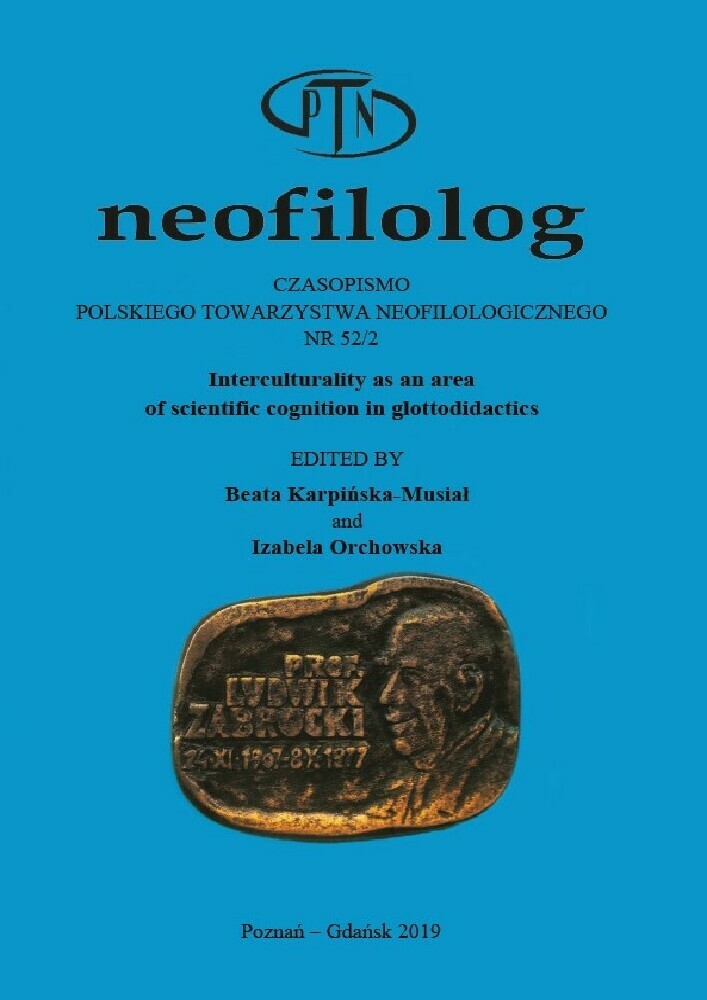Abstrakt
Second language education (SLE) must remain open to developments in the world if it is to be relevant to those who have an investment in it: learners, teachers and researchers. However, the broadening of the in-terdisciplinary nature of SLE that may occur because of this is not with-out its problems. New areas will bring ideas and terminology that will make SLE as a discipline even more complex. In addition, the ideas and terminology may be disputed in the fields from which they originate thus compounding the problem of complexity. The article looks at the example of the performative in SLE and how it supports an approach that is interdisciplinary and intercultural. It also looks at some of the problems this causes: the implications of implementing an SLE practice that is performative, the fact that there are different performative prac-tices, as well as variance between seemingly similar performative prac-tices because of national and cultural differences. The article concludes with the description of two studies which show the complex nature of performative SLE as praxis.Bibliografia
Bańczerowski J. (1975), Is Metaglottodidactics Necessary? (in) “Glottodidactica”, No. 8, pp. 21-26.
Blaszk M. (2016), An inquiry into happening in school education: some of the questions it poses to teaching English as a foreign language in schools (in) Stanulewicz D., Janczukowicz K., Rocławska-Daniluk M. (eds.), Language education: controversies, observations and proposals. Frankfurt am Main: Peter Lang, pp. 199-214.
Blaszk M. (2017), Happening in Education – Theoretical Issues. Frankfurt am Main: Peter Lang.
Council of Europe (2001), Common European Framework of Reference for Lan-guages: Learning, teaching, assessment. Cambridge: Cambridge University Press.
Crutchfield J., Schewe M. (2017), Introduction: Going Performative in Intercul-tural Education. International Contexts, Theoretical Perspectives and Models of Practice (in) Crutchfield J., Schewe M. (eds.), Going Performa-tive in Intercultural Education. International Contexts, Theoretical Per-spectives and Models of Practice.Bristol: Multilingual Matters, pp. xi-xxv.
Dakowska M. (2014), O rozwoju dydaktyki języków obcych jako dyscypliny naukowej. Warszawa: Wydawnictwo Uniwersytetu Warszawskiego.
Domańska E. (2007), „Zwrot performatywny” we współczesnej humanistyce (in) “Teksty Drugie”, No. 5, pp. 48-61.
Geertz C. (1973), The Interpretation of Cultures. New York: Basic Books.
Goffman E. (1959), The Presentation of Self in Everyday Life. New York: Anchor Books.
Frimberger K. (2017), The Ethics of Performative Approaches in Intercultural Education (in) Crutchfield J., Schewe M. (eds.), Going Performative in Intercultural Education. International Contexts, Theoretical Perspec-tives and Models of Practice. Bristol: Multilingual Matters, pp.21-40.
Garoian C.R. (1999), Performing Pedagogy: Toward an Art of Politics. Albany: State University of New York Press.
Karpińska-Musiał B. (2015), Międzykulturowość w glottodydaktyce. Gdańsk: Wydawnictwo Uniwersytetu Gdańskiego.
Kirby M. (1966), Happenings: An Illustrated Anthology. New York: E.P. Dutton & Co., Inc.
Królica, M. (2006), Drama i happening w edukacji przedszkolnej. Kraków: Oficyna Wydawnicza Impuls.
Layzell R. (1993), Live Art In Schools. London: The Arts Council of Great Britain.
Maley A., Duff A. (1987), Drama Techniques in Language Learning: A Resource Book of Communication Activities for Language Teachers. Cambridge: Cambridge University Press.
Morawski S. (1971), Happening (2). Rodowód – charakter – funkcje (in) “Dialog”, No. 10, pp. 117-144.
Pawłowski T. (1982), Happening. Warszawa: Wiedza Powszechna.
Rintoul D. (2011), Drama workshops attended by the author. Between Festival, 19-21 May. Sopot, TeatrWybrzeże – ScenaKameralna.
Schechner R. (1982), The End of Humanism: Writings on Performance. New York: Performing Arts Journal Publications.
Sobkowiak P. (2015), Interkulturowość w edukacji językowej. Pożnan: Wydawnictwo Naukowe UAM.
Turner V. (1957), Schism and Continuity in African Society: A Study of Ndembu Village Life. Manchester: Manchester University Press.
Wilczyńska W., Michońska-Stadnik A. (2010), Metodologia badań w glottodydaktyce. Wprowadzenie. Kraków: Avalon.
Licencja
Prawa autorskie (c) 2019 Martin Blaszk

Utwór dostępny jest na licencji Creative Commons Uznanie autorstwa – Bez utworów zależnych 4.0 Międzynarodowe.
Przedstawiany utwór (artykuł) upubliczniany jest na podstawie umowy z autorem i na licencji Creative Commons Attribution-NoDerivatives 4.0 International (CC BY-ND 4.0).
Użytkownicy mają obowiązek podania wraz z rozpowszechnionym utworem, informacji o autorstwie, tytule, źródle (odnośniki do oryginalnego utworu, DOI) oraz samej licencji;
- bez tworzenia utworów zależnych,
- utwór musi być zachowany w oryginalnej postaci.
Uniwersytet im. Adama Mickiewicza w Poznaniu zachowuje prawo do czasopisma jako całości (układ, forma graficzna, tytuł, projekt okładki, logo itp.).

